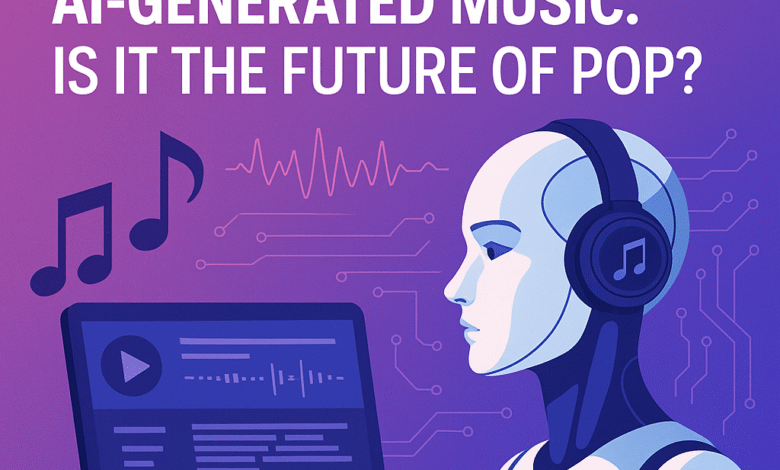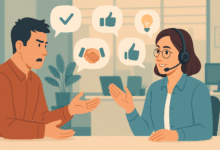Inside the Rise of AI-Generated Music: Is It the Future of Pop?
In the evolving landscape of the music industry, AI-generated music is no longer a futuristic concept—it’s a current phenomenon reshaping how songs are written, produced, and even performed.

In the evolving landscape of the music industry, AI-generated music is no longer a futuristic concept—it’s a current phenomenon reshaping how songs are written, produced, and even performed. With advancements in artificial intelligence, machine learning, and audio synthesis, a new era of creativity is emerging—one that’s sparking both excitement and controversy in the world of pop music. But is this just a technological trend or the foundation of a musical revolution?
EXPLORE THE CONTENTS
The Evolution of Music Meets Artificial Intelligence
Artificial intelligence in music isn’t entirely new. Early examples date back to the 1950s when computer scientists experimented with algorithmic compositions. However, only in the past decade has the technology matured enough to produce music that is not only coherent but also emotionally resonant and commercially viable. Platforms like OpenAI’s MuseNet and Google’s Magenta can now create entire compositions in various styles, from classical to hip-hop to mainstream pop.
The reason for this leap forward lies in machine learning models that are trained on thousands—or even millions—of existing songs. These models learn patterns in melody, harmony, rhythm, and lyrics, and then use that data to generate original content. This capability has empowered producers, songwriters, and even hobbyists to create studio-quality tracks without traditional musical training.
AI in the Recording Studio: From Tool to Collaborator
One of the most intriguing aspects of AI in music production is its evolution from being a mere assistant to becoming a full-fledged collaborator. Today’s AI tools can compose melodies, suggest chord progressions, write lyrics, and even simulate human vocals with frightening accuracy.
Tools like Amper Music, AIVA (Artificial Intelligence Virtual Artist), and Soundraw enable artists to generate royalty-free background tracks or entire songs at the click of a button. Meanwhile, vocal synthesis software such as Yamaha’s VOCALOID and DeepVocal can create singing voices that are indistinguishable from human performers.
Major artists are also jumping on the trend. In 2020, Canadian musician Grimes revealed that she was working with AI to produce music, while Taryn Southern was among the first to release a full-length album co-produced with AI. As artists begin to treat AI as a co-writer rather than just a tool, the line between human and machine creativity continues to blur.
Pop Music’s Embrace of AI
Pop music, known for its accessibility and mass appeal, has been particularly quick to embrace AI-generated content. Given the genre’s reliance on catchy hooks, polished production, and repeatable structures, AI systems are particularly well-suited to crafting hit pop songs. They can quickly generate multiple variations of melodies or lyrics and refine them based on listener preferences, effectively optimizing for virality.
In fact, some pop hits have already included AI-generated elements. In 2019, the song “Break Free” by artist Taryn Southern featured music entirely composed by Amper Music, while the viral hit “Daddy’s Car”—styled in the vein of The Beatles—was generated by Sony CSL Research Lab’s Flow Machines.
Moreover, music streaming algorithms on platforms like Spotify and Apple Music are also heavily AI-driven. These algorithms not only suggest songs but are now being trained to create them, based on what users want to hear. This represents a new cycle in which AI-generated music feeds directly into AI-curated playlists, further integrating machine intelligence into the daily lives of listeners.
Economic Disruption in the Music Industry
The rise of AI-generated music is also reshaping the economics of the music business. Traditionally, music production involves a team of songwriters, composers, session musicians, sound engineers, and producers—all of whom come with costs and time constraints. AI eliminates many of these barriers by offering quick, low-cost alternatives.
For independent artists, this democratization is empowering. It allows them to create high-quality music without the need for expensive studio sessions or professional collaborations. But for music professionals whose livelihoods depend on these roles, the emergence of AI poses a real threat. As AI becomes more capable, there is growing concern about job displacement in areas like composing, arranging, and even performing.
Record labels are also exploring how to cut costs using AI. Some are investing in AI start-ups to streamline production pipelines, manage copyrights, and analyze market trends more effectively. As music becomes more data-driven, traditional industry practices are undergoing a massive transformation.
Ethical and Legal Challenges
With the rise of AI in music creation, new ethical and legal dilemmas are emerging. One of the most pressing issues is authorship: Who owns the rights to a song created by an AI? Is it the person who programmed the AI, the user who generated the track, or the AI company itself?
Copyright laws are currently ill-equipped to handle these questions. In many jurisdictions, only works created by humans are eligible for copyright protection. This creates legal grey areas for songs where a significant portion—or even the entirety—was created by AI.
There’s also the issue of creative plagiarism. AI models are trained on existing music, and there’s a risk that generated songs could unintentionally mimic copyrighted material. Several lawsuits have already surfaced, claiming that AI-generated content closely resembles existing songs, raising concerns about intellectual property rights.
The Question of Authenticity
For many listeners and musicians, authenticity is a key element of music. Songs are often valued not just for their sonic qualities but for the stories, emotions, and intentions behind them. Critics argue that AI-generated music lacks soul, since it doesn’t stem from lived experiences or human emotion.
However, others counter that the emotional impact of music lies in the perception of the listener, not the origin of the composition. If an AI-generated song moves someone emotionally, does it matter whether it was created by a machine or a person?
This philosophical debate is still ongoing, but it is clear that public perception plays a significant role in the acceptance of AI in the music world. As AI-generated music becomes more prevalent, listeners may have to reassess their definitions of artistry and authenticity.
The Role of Human Musicians in an AI World
Rather than replacing human musicians, AI may ultimately serve to enhance their capabilities. Artists can use AI as a creative springboard, generating ideas they wouldn’t have thought of on their own. It can help overcome writer’s block, provide instant feedback, and even inspire new genres.
Some see this as the beginning of a new musical era—one in which humans and machines collaborate symbiotically. Instead of fearing AI as a replacement, musicians are learning to embrace it as a partner in creativity.
This approach is especially appealing to younger generations of artists who are more comfortable with technology. In fact, AI literacy is quickly becoming a valuable skill in music education, with institutions like Berklee College of Music incorporating AI tools into their curriculum.
The Future: AI as a Genre?
As AI-generated music becomes more mainstream, a new genre may be emerging: AI-pop. This subgenre blends traditional pop structures with AI-produced elements, often showcasing robotic vocals, hyper-polished beats, and experimental melodies. Artists like Ash Koosha, Holly Herndon, and YACHT have already released music explicitly labeled as “AI-assisted.”
In parallel, virtual artists—fully fictional characters with AI-generated music—are also gaining traction. The Japanese vocaloid Hatsune Miku paved the way, and now AI-powered avatars like FN Meka are generating millions of streams and social media followers. These artists don’t age, don’t tour (unless virtually), and are infinitely customizable—making them attractive assets for music labels and marketers.
This raises the provocative question: Will the pop stars of tomorrow be human at all?
The Impact on Music Culture and Identity
Music is not just entertainment—it’s a cultural touchstone. It reflects society, identity, and human experience. The increasing role of AI in music production could lead to a shift in what music represents. Will the future of pop prioritize algorithmic perfection over human imperfection? Will curated data points replace raw emotion?
Critics worry that mass-produced AI tracks could dilute the diversity and richness of musical cultures. Others argue that AI could be a bridge to global inclusivity, generating styles that blend cross-cultural influences more seamlessly than ever before.
In either case, the influence of AI is not just technological—it’s profoundly cultural. As such, musicians, technologists, and listeners alike must carefully consider the broader implications.
Conclusion: Harmonizing the Human and the Machine
The rise of AI-generated music is more than a novelty—it’s a transformative force in the music industry. From democratizing production to challenging long-held notions of creativity, AI is changing how music is made, consumed, and understood.
While concerns about authenticity, copyright, and artistic displacement are valid, so too are the opportunities for innovation, collaboration, and inclusivity. As pop music evolves alongside this technology, a hybrid future seems most likely—one in which humans and machines co-create, complementing each other’s strengths.
In the end, the question is not whether AI will replace musicians, but how musicians will use AI to redefine what’s possible. The future of pop may not be purely artificial or purely human—but rather a harmonious blend of both.







